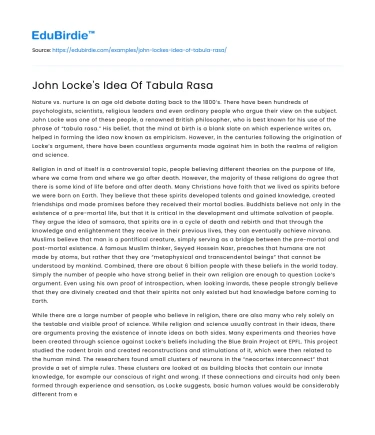Nature vs. nurture is an age old debate dating back to the 1800’s. There have been hundreds of psychologists, scientists, religious leaders and even ordinary people who argue their view on the subject. John Locke was one of these people, a renowned British philosopher, who is best known for his use of the phrase of “tabula rasa.” His belief, that the mind at birth is a blank slate on which experience writes on, helped in forming the idea now known as empiricism. However, in the centuries following the origination of Locke’s argument, there have been countless arguments made against him in both the realms of religion and science.
Religion in and of itself is a controversial topic, people believing different theories on the purpose of life, where we came from and where we go after death. However, the majority of these religions do agree that there is some kind of life before and after death. Many Christians have faith that we lived as spirits before we were born on Earth. They believe that these spirits developed talents and gained knowledge, created friendships and made promises before they received their mortal bodies. Buddhists believe not only in the existence of a pre-mortal life, but that it is critical in the development and ultimate salvation of people. They argue the idea of samsara, that spirits are in a cycle of death and rebirth and that through the knowledge and enlightenment they receive in their previous lives, they can eventually achieve nirvana. Muslims believe that man is a pontifical creature, simply serving as a bridge between the pre-mortal and post-mortal existence. A famous Muslim thinker, Seyyed Hossein Nasr, preaches that humans are not made by atoms, but rather that they are “metaphysical and transcendental beings” that cannot be understood by mankind. Combined, there are about 6 billion people with these beliefs in the world today. Simply the number of people who have strong belief in their own religion are enough to question Locke’s argument. Even using his own proof of introspection, when looking inwards, these people strongly believe that they are divinely created and that their spirits not only existed but had knowledge before coming to Earth.
Save your time!
We can take care of your essay
- Proper editing and formatting
- Free revision, title page, and bibliography
- Flexible prices and money-back guarantee
While there are a large number of people who believe in religion, there are also many who rely solely on the testable and visible proof of science. While religion and science usually contrast in their ideas, there are arguments proving the existence of innate ideas on both sides. Many experiments and theories have been created through science against Locke’s beliefs including the Blue Brain Project at EPFL. This project studied the rodent brain and created reconstructions and stimulations of it, which were then related to the human mind. The researchers found small clusters of neurons in the “neocortex interconnect” that provide a set of simple rules. These clusters are looked at as building blocks that contain our innate knowledge, for example our conscious of right and wrong. If these connections and circuits had only been formed through experience and sensation, as Locke suggests, basic human values would be considerably different from each other, which is inaccurate. This biological evidence proves that the connectivity within these clusters must have been programmed in advance. Next to math, science is the closest type of study that can be falsified. It has been proven through this type of study, naturalistic observation and experimentation that our minds do have innate ideas and thoughts.
The argument between science and religion is another topic, however they both do agree on the fact that humans and animals have inherent principles. By using either introspection to question your own beliefs or by simply looking at the scientific data, it is obvious that the mind is not “tabula rasa,” and that it has been previously written on. Of course, experience is essential in the development of our mind however it is not the only source of personality and individuality. Whether you believe in pre-mortal spirits or the genetic code in our brains, it is undeniable that we are born with natural ideas, values and knowledge.






 Stuck on your essay?
Stuck on your essay?

